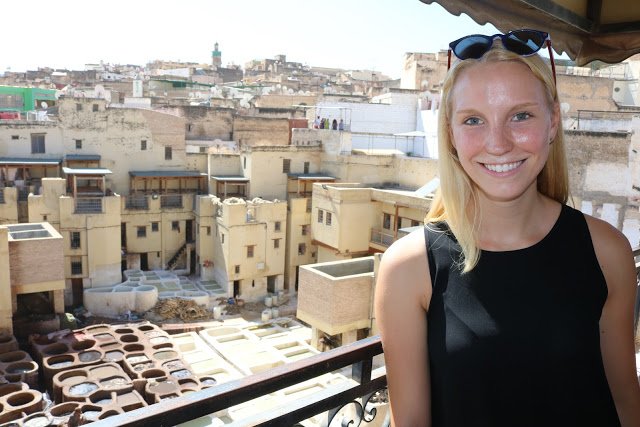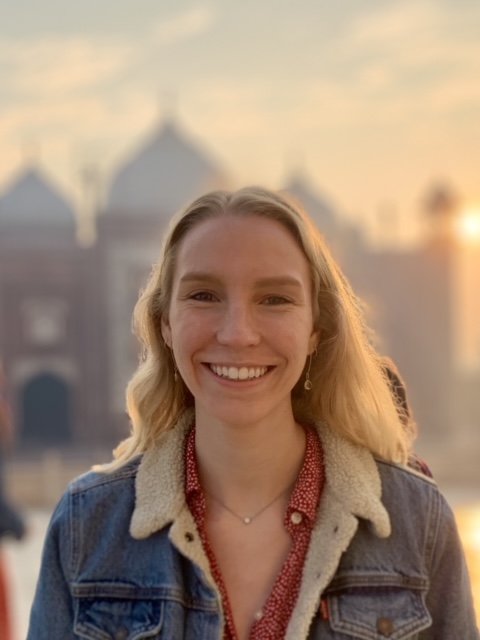Special Edition Spring 2023: Go Global with Kate Yapp: Being a Woman In, Outside Of and After St. Kate’s
By Kate Yapp
I did not realize just how unique it was to learn and lead like a Katie until I went abroad. I also recognize that not every woman and/or St. Kate’s student looks like me or is treated the same by the world.
I interviewed some members of the St. Kate’s community with international experience and Dania Khan, a queer woman of color who participated in the same CIEE Prague program as me, for their perspectives on how women and marginalized groups are treated internationally, how to be sensitive to already established norms in other places, their understanding of what women are capable of and how they can change the world around them to be better.
Amber Palace in Jaipur, India
Elsa Joly ‘23 (Economics) is an international student at St. Kate’s, originally from Marseilles, France, who came to the U.S. for college.
Of women who don’t attend a historically women’s college, Joly said, “I think they are missing out on growing their voice. St. Kate’s gives that space where you can explore and learn from people of many different backgrounds.”
Joly pointed out, “Women are still underrepresented in finance and economics, which is part of why I chose to go into these fields. It’s not super obvious when you come to St. Kate’s because all of the economics and finance professors and students are women, but when you get out into the workforce, it’s mainly male representation.”
A lot of the graduate schools Joly is applying to, both in France and Switzerland, have classes made up of 20% women and 80% men.
“I feel like that is really representative of the French population. Girls are more pushed toward literature or history and told to keep the science and business for men. I don’t know if I could have [taken the same path] when I was in France because I wouldn’t have had the chance to focus as much on economics. I would have been pushed more towards marketing or management.”
Joly said, “I think women can really make an addition to the field of economics when it comes to gender and race disparities and by doing their research and exploring these fields, they can improve policies.”
In a St. Kate’s class, Joly looked at financial literacy of women in India and noticed that Indian women were highly dependent on their husbands and couldn’t open personal bank accounts. “That’s the kind of issue I don’t think many male economists would look at,” Joly said.
Contributions from Katies and women are necessary to making the world a more just, equitable and safe place that is enjoyable for everyone, especially groups that have been historically underrepresented and undersupported.
Looking ahead, Joly said, “It is important for me to now use the skills and empowerment I gained during the last four years and contribute to environments outside of St. Kate’s. I was surrounded by women and able to grow my voice but I am now ready to be a strong female leader and bring my perspective to new places where the voices of women are missing. It’s one thing to grow your voice around women but you also need to use it around men. In high school, I was highly competitive. I am ready to go back into a coed arena and show them that women are just as good as men.”
Erin Nelsen ‘20 (International Relations and Women and International Development) has extensive experience abroad, not only as an undergraduate student but also through various internships and her master’s degree as a Fulbright scholar. Additionally, she currently works for the U.S. government tracking financial fraud, planning trip itineraries for foreign officials and traveling domestically and overseas for meetings and conferences.
Erin Nelsen abroad
While at St. Kate’s, Nelsen participated in two faculty-led trips, one to Chile studying sustainability with the business department her freshman year and one to India for GSJ her senior year. Nelsen also spent a lot of time in Muslim-majority countries Senegal and Morocco for a semester each and a summer internship.
Erin Nelsen in India
When Nelsen was in Senegal, she interned with a local nonprofit that worked to promote the rights of Senegalese women, mostly within the household. They put on conferences to help local women learn how to budget, how to set smart goals and how to become leaders in their households and the community. “As a whole, Senegalese women don’t have as much power as men in the country,” Nelsen said. As a white American woman, she had more access to opportunities and privilege while in Senegal compared to local women.
In Senegal and Morocco, Nelsen stayed with host families, which gave her more of a glimpse into how gender roles operate within the household in these countries. “I definitely saw women relegated to cleaning and cooking roles.”
For graduate school, Nelsen wanted to see another area of the world, so she completed a Master’s of International Relations and Feminist Security at Aberystwyth University in Wales. Nelsen’s Fulbright research focused on the impact of Brexit on Welsh women’s access to social safety nets and their opportunities for employment in the workforce. “Welsh society seemed a lot more egalitarian between the genders but Brexit certainly impacted women a lot more than it impacted men,” Nelsen said. “Worldwide, it seems like women are kind of on the cusp. In society, if something fluctuates, they’re going to be the ones having to take on most of the burden of that fluctuation.”
Erin Nelsen in Wales
Nelsen said that in Morocco, Senegal and Wales, her learning environments were coed, which was very different from her classes at St. Kate’s. Specifically in Wales, Nelsen said, “The international politics program was heavily male-dominated because the focus of the program was more ‘critical’ or ‘hard’ security and that area is heavily male.”
Nelsen acknowledged that focusing on the unique aspects of feminist security isn’t as distinguished yet. Many of her male colleagues and even some of her male professors didn’t believe in the fundamentals of feminist security. “They didn’t believe that it was a valid field of study and that it was deeply flawed. They wouldn’t even consider some of my perspectives.”
Nelsen is adamant that access to social safety nets and maintaining meaningful employment should not be ignored when considering safety and quality of life for women. It concerned her that these elements were not talked about in class. “We need to be considering women and queer individuals and people of other races in these conversations because it isn’t solely just these theories,” Nelsen said. “They’re shaped by so many other things.”
The experience of my friend Dania Khan sheds light on this. Khan participated in the CIEE Central European Studies Program with me in Prague. I would like to be transparent; her being a queer woman of color made her experience in the Czech Republic different from mine. Luckily, she said she felt free to make the decision of where to study abroad from personal desire and interest and not out of fear for her safety.
Khan said, “When choosing Prague, I didn’t realize until I arrived that it’s quite liberal in terms of its queer community. I saw people holding hands who looked queer. … I never felt I had to change who I am while I was there.”
Khan went on a few dates with a Czech woman while abroad and felt safe holding hands and walking around the capital city. There were also a few gay bars and clubs that our friend group found and felt comfortable in.
Kate Yapp, Dania Khan and two other friends from their CIEE Prague program on a weekend trip to Cesky Krumlov
Khan is part of a queer, Greek life organization where she goes to school in the U.S. and felt homesick for a similar space in Prague.
Charles University in Prague has an LGBTQ+ pride “Charlie Club'' that was well-advertised and seemed accessible. However, Khan realized that just because a queer space exists in your host community does not mean it will feel as comfortable for queer non-locals, nor is it always designed to. Most of the meetings for the student group were in Czech and didn’t feel very welcoming to Americans.
“I didn’t consider how this vulnerable portion of the Czech community might feel about outsiders coming in and taking up space with my English and lack of understanding of their own culture and society. It was a queer space and I am queer, like them, but there were all these different intersecting identities also at play that I didn’t consider compared to when I am in this kind of space back home.”
Khan is an Indian-American woman and was aware that the population of the Czech Republic was majority white. She said, “Being brown was more on my mind because it’s so much more visible than my being queer. I can hide my queerness, but I can’t hide being brown.”
Khan, being from Berkeley, Calif., a very diverse area, was anxious about this before leaving for Prague. She spoke to friends and peer advisors who have studied abroad as people of color and tried to learn as much as she could about the culture in Prague before arriving.
She said, “Normally the stares from Czech people were curious,” and there was already an Indian community established in Prague, albeit a small one. But Khan said, “The one time I wore a hijab [in Prague], I felt like the stares were a little too aggressive for me. That felt like a little too much attention for me at that time.”
Nelsen’s insistence to make international security professionals and scholars expand their understanding of what security looks like for different groups of people is a tangible example of meaningful differences Katies are making in the world — that are very much needed but would otherwise be absent.
Charlotte Kadifa ‘23 (History and French) studied abroad through IES in Nantes, France, during spring 2022.
She said, “France has an interesting culture for women because catcalling is super common there. I don’t know how I got through four months without getting catcalled, but my family thinks it’s because I am half-Lebanese so people assumed I was Muslim or I look older. I also have kind of a death stare and would just have headphones in. But it’s very stereotypical for a European man to just be like ‘hey baby.’”
Charlotte Kadifa in France
Joly read stuff online about French women not going to the police when crises happen because “it’s only men working there and they aren’t going to take these women seriously, like how women are treated by police in the U.S. Like, ‘You were dressed like this so you deserved it.’ And there are a lot of women who have died because of domestic abuse. In a lot of cases, if the police had stepped in beforehand, these women would still be alive.”
However, Kadifa had positive things to say about French welfare policies for women. “The social safety network is really trying to encourage women to do anything they want. They can work and have kids and manage both. The government gives a stipend for each kid and public schooling and childcare are low cost or free. Women can take off work after they have kids or adopt with full pay for almost a year and there’s paternity leave.” Kadifa also noticed that many of the candidates during the French presidential election were women and the current prime minister of France is a woman.
Kadifa stayed with a host family in Nantes and both of her parents worked from home and cooked together. “It seemed pretty equal. I was a bit surprised but also not. My host father was Dutch and maybe that was a factor. His attitude seemed to be, ‘Yes I contribute to my household but not just in a financial way. I can contribute through cooking, cleaning and all of that stuff.’”
Charlotte Kadifa in France
Kadifa has had the opportunity to travel a lot and she said her approach is “to always just defer to the local culture. I go with what is happening. I let the culture happen and work to fit in it. I am the one who is in their space so I’m going to follow their norms. I know as an American, I attract a lot of attention when I’m in a different country. And my goal is to minimize that.”
Economics professor Dr. Deep Shikha grew up in Delhi, the capital city of India, and leads a GSJ course over J-terms. Of her upbringing, she said, “Growing up in India, girls were given less importance than boys in social hierarchy. A girl child was not as important as a boy child for economic and social security reasons because after marriage, the girls leave their parents’ home and add value to some other family.”
Deep Shikha as a young woman in India
“Growing up, my role was predefined. I was brought up to be a housewife … a household manager. I learned skills like budgeting; not necessarily cooking but doing household chores. In middle class families, girls were given a chance to go to school and go to college. But the expectation was that once they get their secondary education, they’ll get married.”
Shikha has hope, though. “I’m talking about what I saw 60 years ago. It’s not even the same as what’s happening right now. India is a large country: There is a lot of disparity between rural and urban areas and how people think about gender. You might still find pockets in rural areas where people still think [more traditionally] about [gender], even little tiny pockets in the urban areas. All human societies are evolving and I think that mindset has evolved with time. Change comes really slowly but it does come.”
Shika pointed out that Americans should evaluate how our own society holds back women.
“I never heard as a girl that I was not good at math or that girls are not intelligent. It was weird when I got to the U.S. and heard girls say, ‘I’m a girl so I’m not so good at math.’ I never saw that correlation because I never heard that message. In India it was, ‘Girls can be good but their roles are predefined.’ They can study all they want to, they can be doctors, lawyers or professors but they still have some predefined roles to be respected.”
Upon first coming to St. Kate’s, Shikha was frustrated. “We said, ‘We want to empower women.’ We said, ‘They should be all they can be.’ If that is the case, why are we not putting them in positions of power in more male-dominated fields, not just women-dominated professions? We were still pushing women into traditional roles as teachers and nurses that are typically lower paid.”
This motivated Shikha to push for an M.B.A. program at St. Kate’s.
Shikha said, “I hope the message that students are now taking from St. Kate’s is that you can be anything you wish. You can be a political leader, you can be an economic leader, you can run for office, you can get IT jobs and you can be a changemaker.”
When Shikha returns to India for GSJ, she always tells students, “We have to be sensitive to cultural nuances. We can’t act as if we have all of the solutions. We go as learners and not as fixers. I see light in a woman’s eyes in these rural villages when they tell us about their community leadership roles and their accomplishments. In the United States, we’re not as far ahead as we think. Some humility would help us. A lot of the leading and influencing that St. Kate’s students can do still needs to happen in the U.S.”















